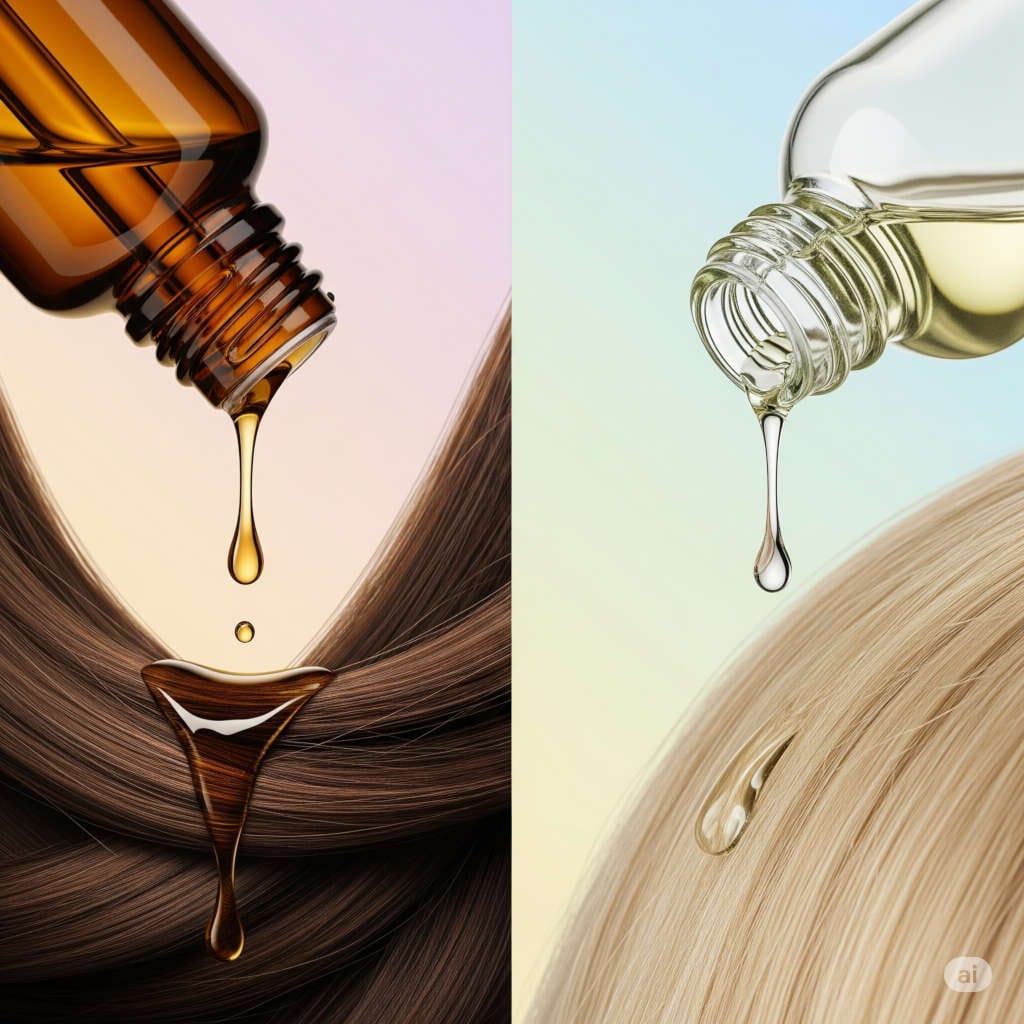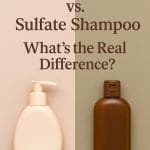When it comes to natural hair care, two ingredients often stand out from the crowd: argan oil and coconut oil. These nourishing oils have become staples in beauty routines around the world, and for good reason. But if you’re wondering which one is better for your hair, you’re not alone. Both oils offer unique benefits, and the best choice often depends on your hair type, needs, and how you plan to use the oil.
In this comprehensive guide, we’ll compare argan oil and coconut oil side-by-side to help you make the right decision for your hair. Whether you’re struggling with dryness, frizz, damage, or simply want healthier hair, this post has you covered.
What is Argan Oil?
Argan oil is derived from the kernels of the argan tree, which is native to Morocco. Known as “liquid gold,” it’s been used for centuries in Moroccan culture for its healing and cosmetic properties.
Key Nutrients:
- Vitamin E: A powerful antioxidant that promotes scalp health and supports hair growth.
- Essential Fatty Acids: Includes oleic and linoleic acids that moisturize and nourish the hair.
- Antioxidants: Help repair damage and protect from environmental stressors.
- Squalene: Enhances hair’s elasticity and softness.
Texture and Absorption:
Argan oil has a lightweight consistency, making it ideal for leave-in use without leaving hair greasy or weighed down.
What is Coconut Oil?
Coconut oil is extracted from the meat of mature coconuts and has been a go-to remedy in many tropical regions for generations. It’s known for its versatility in cooking, skincare, and especially hair care.
Key Nutrients:
- Lauric Acid: A medium-chain fatty acid that deeply penetrates the hair shaft.
- Vitamin E and K: Support scalp and follicle health.
- Antimicrobial Properties: Helps combat dandruff and scalp infections.
Texture and Absorption:
Coconut oil is thicker than argan oil and solid at room temperature, which means it often needs to be warmed before use.
Argan Oil vs. Coconut Oil: Benefits Comparison
Let’s dive into what each oil can do for your hair, so you can decide which aligns with your specific hair needs.
1. Moisturizing Power
- Argan Oil: Moisturizes hair without making it greasy. Ideal for fine or oily hair types.
- Coconut Oil: Penetrates deeply into the hair shaft, making it excellent for deep hydration.
2. Frizz Control and Shine
- Argan Oil: Smooths the hair cuticle and adds a healthy, non-oily shine.
- Coconut Oil: Can help reduce frizz but may leave a residue if used too much, especially on fine hair.
3. Damage Repair
- Argan Oil: Rich in antioxidants that help repair heat and color damage.
- Coconut Oil: Prevents protein loss, which is essential for repairing breakage and split ends.
4. Scalp Health
- Argan Oil: Soothes a dry, itchy scalp and supports overall scalp health.
- Coconut Oil: Antifungal and antibacterial properties make it effective against dandruff.
5. Daily Use vs. Weekly Treatment
- Argan Oil: Great for everyday use as a styling serum or leave-in conditioner.
- Coconut Oil: Best used 1-2 times a week as a deep conditioning treatment.
How to Use Argan Oil for Hair
Argan oil is incredibly versatile and easy to incorporate into your routine:
1. Leave-In Conditioner
After washing your hair, apply 2-3 drops of argan oil to damp hair, focusing on the mid-lengths and ends.
2. Styling Serum
Use a drop or two on dry hair to tame flyaways, add shine, and reduce frizz.
3. Scalp Treatment
Massage a small amount into your scalp once a week to soothe irritation and promote hair growth.
4. Heat Protectant
Before using a blow dryer or flat iron, apply a small amount of argan oil to help prevent heat damage.
How to Use Coconut Oil for Hair
Coconut oil works best when used as a mask or pre-treatment:
1. Pre-Shampoo Treatment
Apply warm coconut oil to dry hair and scalp. Leave it on for 30 minutes (or overnight for deep conditioning), then wash thoroughly.
2. Hair Mask
Mix coconut oil with honey or yogurt for a deeply hydrating mask.
3. Scalp Treatment
Massage into the scalp to combat dandruff and boost circulation.
4. Split-End Sealer
Rub a tiny amount into the ends of your hair to prevent or reduce split ends.
Which Hair Type Benefits Most from Argan Oil?
Argan oil is ideal for:
- Fine to medium hair
- Frizzy or wavy hair
- Color-treated or damaged hair
- Hair that needs shine without weight
If your hair tends to get oily easily or you use heat tools regularly, argan oil is a lightweight, protective option.
Which Hair Type Benefits Most from Coconut Oil?
Coconut oil is best suited for:
- Thick, coarse, or curly hair
- Very dry or porous hair
- Hair prone to breakage
- Scalp issues like dandruff or itchiness
If your hair is naturally dry and needs intense moisture, coconut oil is a powerful, deeply nourishing choice.
Common Mistakes to Avoid
With Argan Oil:
- Using too much can weigh hair down.
- Not all argan oils are pure; look for 100% organic, cold-pressed oil.
With Coconut Oil:
- Difficult to wash out if used excessively.
- May cause dryness in protein-sensitive hair.
- Can clog pores if left on the scalp too long.
Can You Use Both Argan and Coconut Oil?
Yes! You can absolutely use both in your haircare routine:
Weekly Routine Example:
- Sunday: Use coconut oil as a pre-wash deep conditioning mask.
- After Every Wash: Apply a few drops of argan oil to damp hair for moisture and shine.
- Daily: Use argan oil to tame frizz or touch up dry ends.
This combination lets you enjoy the deep repair benefits of coconut oil and the lightweight styling perks of argan oil.
DIY Hair Mask with Argan and Coconut Oil
Ingredients:
- 1 tablespoon coconut oil (melted)
- 1 tablespoon argan oil
- Optional: 2 drops of lavender or rosemary essential oil
Instructions:
- Mix ingredients in a small bowl.
- Apply generously to dry hair, focusing on mid-length to ends.
- Cover with a shower cap and leave on for at least 30 minutes.
- Shampoo and condition as usual.
Use this mask once a week for deeply nourished, glossy hair.
Final Thoughts: Which Is Better?
The truth is, neither oil is categorically better than the other. It all depends on your hair’s needs:
Choose Argan Oil if You Want:
- Lightweight daily moisture
- Frizz control without heaviness
- A finishing oil for shine
- Heat protection
Choose Coconut Oil if You Need:
- Deep hydration and protein repair
- A scalp treatment for dandruff
- A natural deep conditioner
- An overnight mask for intense nourishment
Why Not Both?
In many cases, incorporating both oils at different stages of your hair routine can deliver the best results. Argan oil excels as a daily leave-in, while coconut oil works wonders as a weekly repair treatment.
Quick Comparison Table
| Feature | Argan Oil | Coconut Oil |
|---|---|---|
| Texture | Lightweight | Thick, solid at room temp |
| Daily Use | Yes | No (use 1-2 times/week) |
| Penetration | Coats hair | Deeply penetrates shaft |
| Heat Protection | Yes | No |
| Best For | Fine, frizzy, color-treated hair | Dry, damaged, thick, curly hair |
| Scalp Benefits | Soothes, moisturizes | Fights dandruff, strengthens roots |
| Shine Factor | High, non-greasy | Moderate, can be greasy |
Final Advice
Your hair is as unique as you are. The best way to find out whether argan oil or coconut oil works for you is through careful experimentation. Start with small amounts, observe how your hair responds, and adjust your routine accordingly. And remember, the best routines are consistent, gentle, and suited to your individual hair type.
By understanding the differences and benefits of each oil, you’re well on your way to stronger, shinier, and healthier hair.
Have you tried argan or coconut oil? Which one worked better for your hair? Let us know in the comments below!






